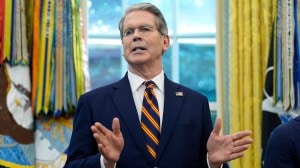Who’s afraid of the underworld?
Prakash Shetty now drives his own car, sits at the cash counter of his South Mumbai hotel, sometimes even takes a Route 62 bus to the City C...

Prakash Shetty now drives his own car, sits at the cash counter of his South Mumbai hotel, sometimes even takes a Route 62 bus to the City Civil and Sessions Court, Fort, where he’s fighting his landlord in a civil suit.
The judge asks if there’s still a threat to his life. ‘‘No, sir,’’ he says. For Shetty, threatened by the Chhota Shakeel gang and under a security blanket for four years, life’s hopping back to normal.
This year, builder Vallabh Dedia didn’t make his annual visit to the Mumbai police headquarters at Crawford Market to renew his weapons licence. In 1997-09, Dedia had received threats from Shakeel, Chhota Rajan and Abu Salem. He bought a .32 Colt pistol. ‘‘But I don’t want it any more. There is no threat,’’ he says.
Dedia and Shetty are not alone. Business barons, hoteliers, film personalities and industrialists, who once paid huge sums in extortion money, are now waxing eloquent about the men in khaki.
Even five years back, land grabbing, property disputes, music rights, film distribution, business dealings, smuggling — even government contracts and tenders — were controlled by Mumbai’s expatriate dons. But phones don’t announce extortion calls any more. The guns have fallen silent too. Even police encounters are down to a trickle.
‘‘Underworld activities are at the lowest level ever. They’re almost finished,’’ claims Police Commissioner A.N. Roy.
This is how it happened.
Mumbai in the 1970s was a gangster’s paradise. While Haji Mastan, Yusuf Patel, Karim Lala, Alamzeb and Amirzada fought bitterly over the pickings from dockyard smuggling, others diversified into extortion, drugs and weapons. In the early 1990s, a team of senior policemen — including then police commissioner Ronnie H. Mendonca, joint commissioner D. Sivanandhan, deputy commissioner Rakesh Maria — chalked out a strategy.
Daring officers were recruited and armed with a free hand. The encounter specialists were born — Vijay Salaskar, Raju Pillai, Shivaji Kolekar, Pradeep Sharma, Praful Bhosle, Sanjay Kadam, Ravindra Angre and Daya Nayak. In the next few years, over 600 gangsters were killed in encounters. Aiding the police were two stringent — and much debated — laws: the Maharashtra Control of Organised Crime Act, 1999, and the older Maharashtra Prevention of Disruptive Activities Act, 1981.
Arrests under these acts included some sensational ones like Sessions Court judge J.W. Singh, film financier and diamond merchant Bharat Shah and Bollywood producer Nazim Rizvi, among others.
A string of Bollywood stars were questioned on underworld links, especially over the financing of Chori Chori, Chupke Chupke. But with Shah, Rizvi and Rahim Allabaksh being arrested, Bollywood refused to play ball.
But nothing worked against gangsters more than their in-fighting and games of one-upmanship. In 1998, Arun Gawli gave up crime for politics, launching the Akhil Bharatiya Sena. In 2000, Dawood Ibrahim’s lieutenant Salem broke away. Chhota Rajan’s men formed nascent foster gangs too — under Ejaz Lakdawala, Guru Satam, Bunty Pandey and Hemant Pujari.
The police’ trump card was the Dawood-Rajan feud. In 2001, Shakeel’s henchman Munna Zingada opened fire on Rajan in Bangkok. Rajan’s right hand man Rohit Verma was killed. Rajan himself barely survived.
In the ensuing retaliation, there was enough gunfire for police to play one faction against another. The end was near. Meanwhile, the September 11 attack further skewed the equation. Pakistan and its guest, Dawood, came under fire for aiding the Al-Qaeda. A never-before stringent airport security meant Anees Ibrahim, Noora Ibrahim, Abu Salem, Monica Bedi and Sharad Shetty were detained by UAE for false passports.
Suddenly, even Dubai wasn’t safe. In 2000, India signed an extradition treaty with UAE. Thirteen criminals have been deported since 2000. What remains is to get them convicted.
Photos



- 01
- 02
- 03
- 04
- 05




























